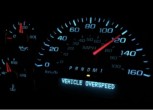
Reckless Driving By Speed in Virginia is punished under Virginia Code §46.2-862. I have provided the official law below which states the following:
Va Code §46.2-862. Exceeding speed limit.
A person is guilty of reckless driving who drives a motor vehicle on the highways in the Commonwealth (i) at a speed of 20 miles per hour or more in excess of the applicable maximum speed limit or (ii) in excess of 85 miles per hour regardless of the applicable maximum speed limit.
Under this law, the are two ways that you can be convicted of Reckless Driving By Speed. The police officer must be able to prove that you drove either 20 mph or more over the posted speed limit or 86 mph or higher regardless of the posted speed limit. This is basically a speeding ticket on steroids. This is the most common type of Reckless Driving offense, hands down.
For example, it is considered Reckless Driving by Speed in Virginia if you drive 75 mph in a posted 55 mph zone or 86 mph in a posted 70 mph zone.
A police officer in Virginia can determine your speed with either radar, laser, or the pace method. A radar has a range of about 5,000 feet, which is about a mile away from the police officer. A radar can be used when the police officer is either parked or driving in any direction relative to you. A laser (or a lidar) has a range of about 2,000 feet, which is about 1/3 a mile away from the police officer. A laser can be used only when the police officer is parked, not while he or she is driving. Furthermore, unlike radar, laser should not be used when it is located behind the police officer's glass windshield or on a day with any type of precipitation. The pace method requires the police officer to follow behind your vehicle at both a constant speed and equal distance for at least 2/10 of a mile. Once this is done, the police officer must look at the speedometer in his or her police car to determine your speed (this is essentially a guess). The pace method is valid only when the police officer first catches up to your vehicle and then begins the pace method. The pace method is not valid if the police officers begins the pace method while he or she is still in the process of trying to catch up to your vehicle.
Regardless of the device or method used to determine your alleged speed, Virginia Code §46.2-882 requires the police officer to have present in court a valid calibration sheet that confirms the police officer's radar, laser, or police car's speedometer has been tested for its accuracy within 6 months before your traffic stop in Virginia.
Furthermore, the police officer's calibration sheet in Virginia must be either the original version or a "true copy." According to Virginia case law, a xeroxed or photocopied version of the police officer's calibration sheet without a "custodian of records certificate" attached to it is not considered a "true copy." Namely, in the case of Untiedt v. Commonwealth, 447 S.E.2d 537,18 Va. App. 836 (1994), the Court of Appeals of Virginia held that a photocopy of a police officer's calibration sheet is admissible into evidence, whether the original is in existence or not, provided that such photocopy is authenticated as a true copy both by the custodian of the original calibration sheet and by the person to whom said custodian reports, if they be different, and is accompanied by a certificate that such custodian does in fact have, or had at the time, the original calibration sheet in his or her custody.
To watch a video on Reckless Driving By Speed In Virginia, click here:
By Michael Huff, Esq.
